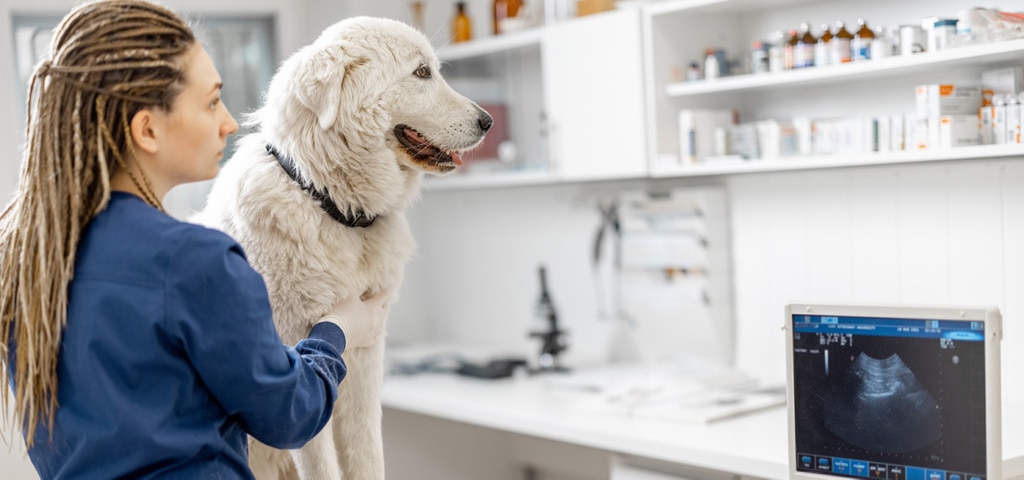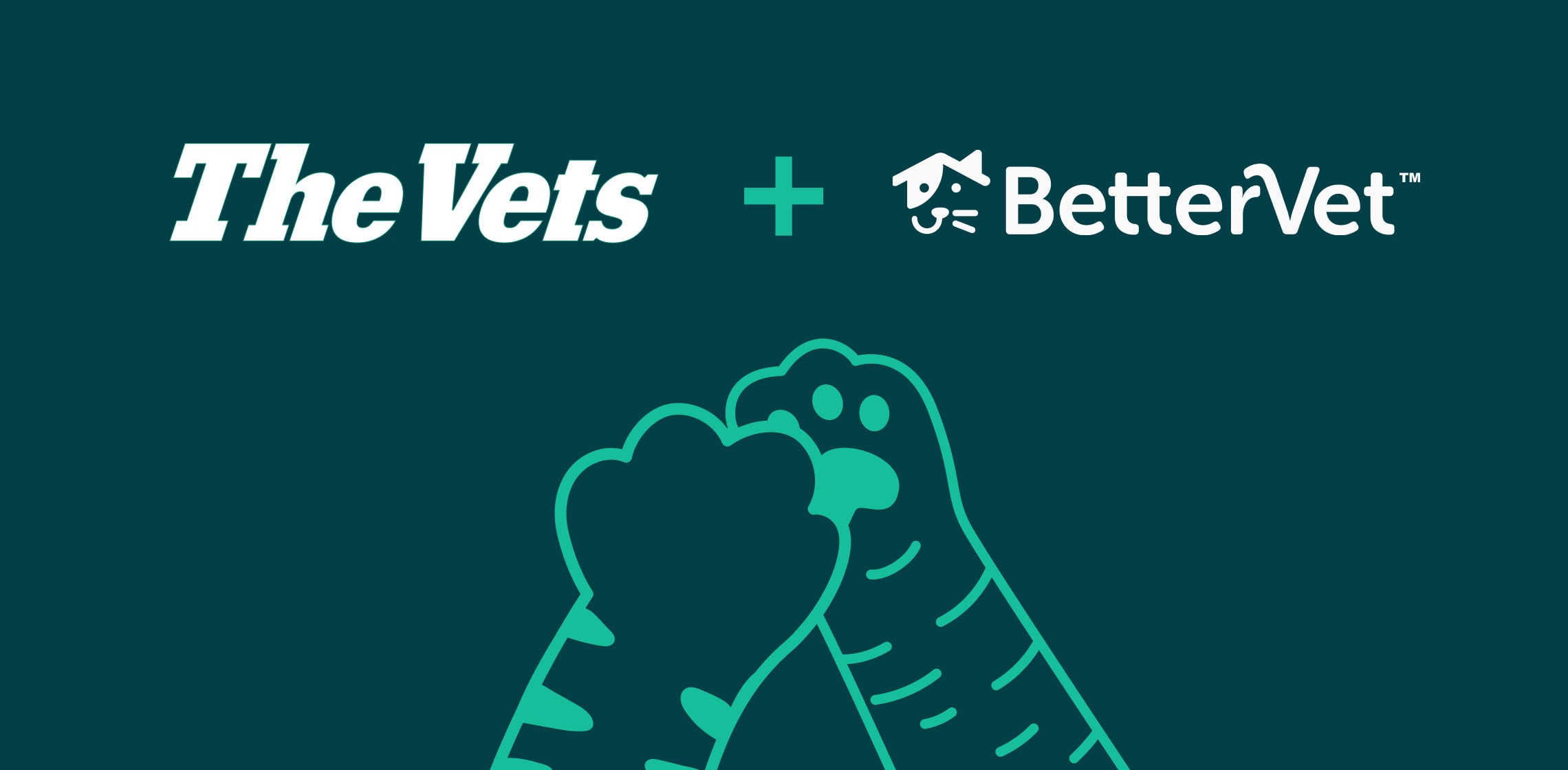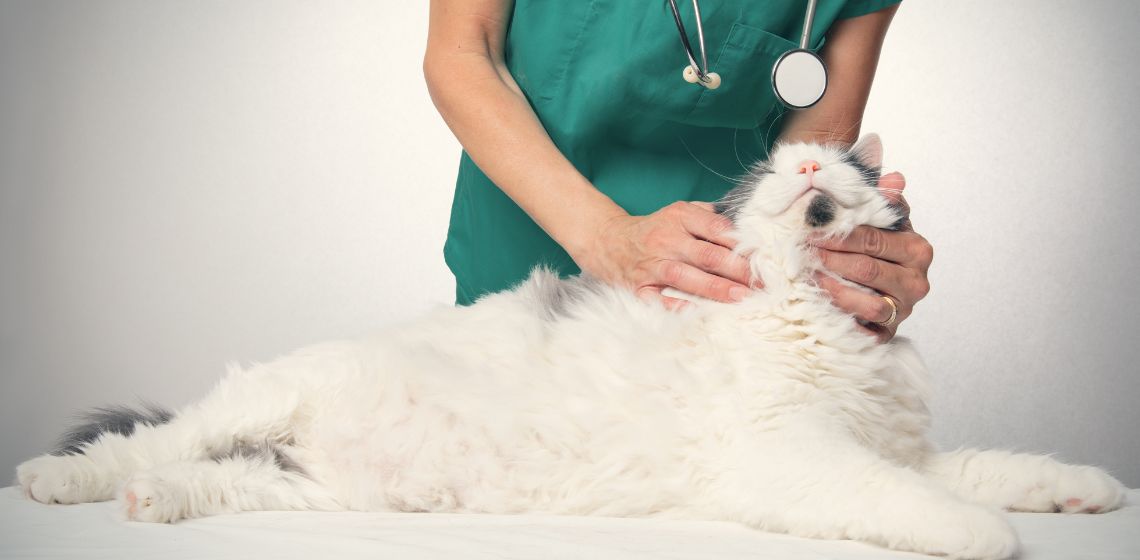Our dogs’ hearts may become enlarged for several different reasons, but it usually indicates that there is a problem with the heart. Many common causes of an enlarged heart cannot be cured, but there is effective treatment available to support the heart and keep dogs’ quality of life as good as possible.
Severity:
Mild to severe, depending on the underlying condition
Table of Contents
Key points
- Requires diagnosis by a veterinarian.
- Treatable by a veterinarian.
- Not transmissible to other animals or humans.
- Usually a lifelong condition.
- Prevention is possible for some causes.
- Diagnosis may require a physical examination, lab tests, x-rays, ECG, and echocardiography.
Common in:
Older dogs of both sexes; occasionally in young dogs with a congenital condition. Certain breeds, such as Cavalier King Charles Spaniel or Doberman, are at higher risk. Heartworm can affect dogs of any age.
Symptoms and types:
A dog’s heart may become enlarged for several different reasons, including leaky valves, genetic problems with the heart muscle, or a congenital condition (one that they are born with) such as a hole in the heart. A severe heartworm infection will also cause an enlarged heart.
In the early stages, an enlarged heart may not cause any symptoms. In the later stages, we can see a variety of symptoms from heart failure, including:
- Reluctance to exercise
- Breathing faster at rest
- Coughing
- Lethargy (quietness)
- Weight loss
- A swollen belly
- Collapsing episodes
Very sadly, in some cases, the first symptom of a heart condition may be sudden death.
Dogs with an enlarged heart are at an increased risk of sudden death (a “heart attack”) and so may pass away at home.
Understanding the diagnostics
Your veterinarian may suspect that your dog’s heart is enlarged if they hear a murmur when they listen to your dog’s chest, or if your dog has an irregular heartbeat. However, not all heart conditions cause these changes, so they may also run tests if your dog has symptoms that fit with heart disease.
Blood tests
Your veterinarian may run general blood tests to look at your dog’s overall health. There are also heart-specific blood tests like pro-BNP and cardiac troponin. Heartworm can also be tested for.
X-rays
An enlarged heart is usually visible on x-rays. Your veterinarian can look at the outline of the heart to try and determine exactly which chambers of the heart are enlarged.
X-rays also allow your veterinarian to look for enlarged blood vessels or signs of fluid in the lungs, which can help to determine how well your dog’s heart is working.
Ultrasound (echocardiography)
An ultrasound scan of the heart (called an echocardiogram) allows a veterinarian to look inside the heart, measure the size of the different chambers, examine the valves, and see how the blood is flowing through the heart.
This is usually the best way to look at the structure of the heart, but it needs specialized training. Some regular veterinarians are trained to perform these scans, but often you will need to see a veterinary cardiologist for this.
Learning about the causes
There are many different causes of an enlarged heart, but we will talk about the most common ones here.
Myxomatous Mitral Valve Disease (MMVD)
This is a common cause of an enlarged heart in older dogs, and is usually seen in dogs weighing less than 55lb (25kg). It is an age-related condition where one of the valves in the heart (the mitral valve) becomes thickened and stiff. This causes it to start leaking, which means the heart is not pumping blood out of itself as effectively as it used to. As a result, this extra blood stretches the heart and causes it to become enlarged.
Dilated Cardiomyopathy (DCM)
DCM is usually a genetic heart disease that is seen in large- and giant-breed dogs such as Dobermans, Boxers, and Great Danes, but also in Cocker Spaniels. It is caused by a faulty gene that weakens the heart muscle, meaning that over time the heart becomes unable to pump blood around the body as effectively. This causes the walls of the heart to stretch and become thin, which leads to an enlarged heart.
In rare cases, DCM is seen in other breeds. This is thought to be due to low levels of Taurine in the diet, which the heart needs to function properly. It leads to the same weakness in the heart muscles.
Congenital Heart Conditions
Congenital conditions are those that a dog is born with. Many different congenital conditions can cause an enlarged heart, including:
- Valve problems (mitral valve dysplasia, tricuspid valve dysplasia, aortic stenosis, pulmonic stenosis)
- Holes in the heart (Atrial or Ventricular Septal Defects)
- Patent Ductus Arteriosus
Heartworm
Heartworm infections can occur in dogs of any age and are caught from mosquito bites. The enlarged heart is caused by worms in the heart, or in the blood vessels around it. This causes a blockage that leads to a buildup of extra blood in the heart, which stretches it, and it enlarges over time.
There are no effective home remedies to treat heart disease – you must see a veterinarian and follow their advice.
Best treatment options
Many of the treatments for an enlarged heart are similar. Your veterinarian can discuss which of these treatments may be appropriate for your dog.
Pimobendan (Vetmedin®)
This medication helps the heart to beat more strongly, and dilates blood vessels to relieve the pressure on the heart. It can be used to treat dogs with MMVD or DCM who are not yet showing symptoms, and has been proven to slow the progress of these diseases, meaning your dog gets a better quality of life for longer. It is also used to improve symptoms in dogs who are showing signs of heart failure.
Diuretics
This class of drugs act to dilate blood vessels and cause extra fluid to be removed by the kidneys, which can relieve pressure on the heart and improve the symptoms of heart failure.
Examples include:
- Frusemide/Furosemide
- Torsemide/Torasemide
- Hydrochlorothiazide
ACE inhibitors
These drugs act to dilate blood vessels to reduce the burden on the heart, and may also slow the progress of some types of heart disease.
Examples include:
- Benazepril
- Enalapril
- Ramipril
- Lisinopril
Heartworm treatment
Dogs who have heartworm need special treatment for this. It is quite complex and can be expensive, but sadly if it is not done then the chances are the infection will be fatal.
Surgery
Mitral valve replacement is a common procedure in humans, but a new and rare one in dogs. It is very expensive and requires a high-level specialist facility, but can have excellent results.
Home remedies and their effectiveness
There are no effective home remedies to treat heart disease – you must see a veterinarian and follow their advice.
If your dog has been diagnosed with heart disease, there are some non-medication treatments you can give them:
- Special low-sodium diets designed for dogs with heart disease have been shown to help in some cases.
- Essential Fatty Acid supplements may also be beneficial.
However, you should check with your veterinarian before starting either of these.
When to see a vet
If your dog is showing any of the symptoms of heart failure, you should see your veterinarian straight away.
FAQ
This depends on the cause of the enlarged heart. A dog with early mitral valve disease may live for several years, but sadly a dog showing symptoms of dilated cardiomyopathy may only live for around six months.
There are medications available to help dogs with enlarged hearts, which can slow the progress of the heart disease and relieve the symptoms. Speak to your veterinarian to discuss which treatments may be right for your dog.
This depends on the cause of the enlarged heart. Sadly, most causes are not curable, but usually the symptoms can be managed for a time with medication.
Dogs with an enlarged heart are at an increased risk of sudden death (a “heart attack”) and so may pass away at home. If not, you may have to make the decision to let them go when their symptoms can no longer be controlled by medication.
Sadly, hearts that have become enlarged do not generally go back to normal by themselves. Very few conditions that cause an enlarged heart can be completely cured, but there are some specialist surgeries for certain conditions, which can have good results. Speak to a veterinary cardiologist for more advice.

Ruth graduated from Cambridge in 2014 and has worked as a small animal GP vet ever since. She is particularly interested in internal medicine, as it combines her love of problem-solving and her somewhat geeky love of knowledge, and has completed her certificate in Small Animal Medicine. She loves animals of all species but is particularly fond of cats.










